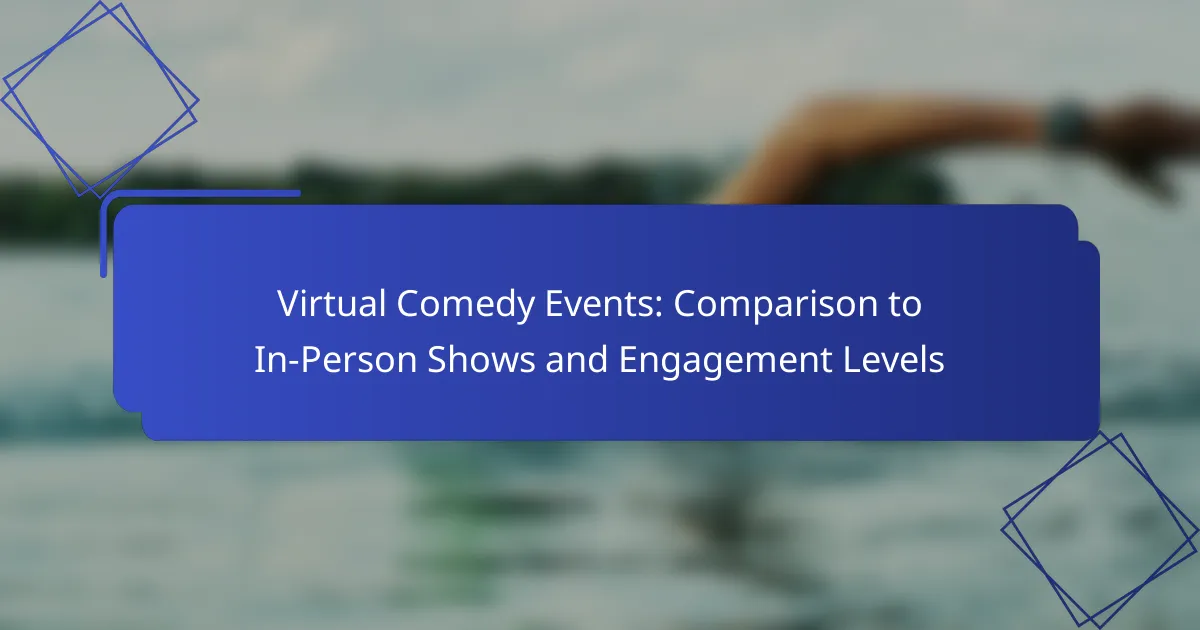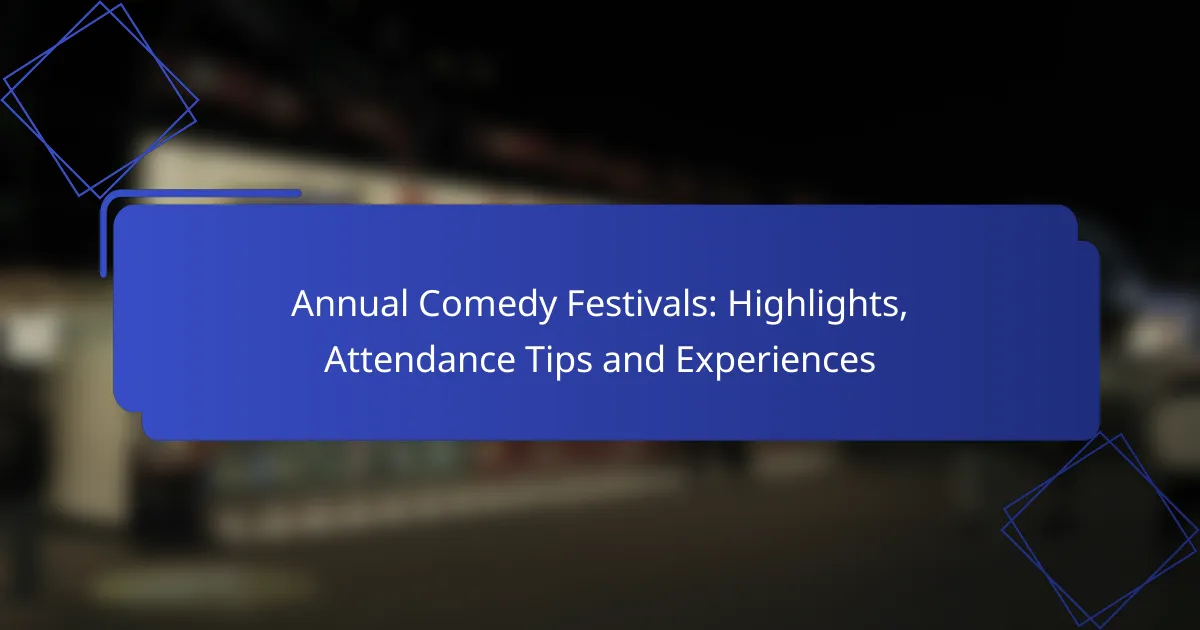Virtual comedy events present a distinct experience when compared to traditional in-person shows, particularly regarding cost, accessibility, and audience interaction. While they can attract a larger audience and are often more affordable, the immediate energy and connection that characterize live performances may be diminished. Understanding these differences is crucial for both comedians and audiences as they navigate the evolving landscape of comedy entertainment.
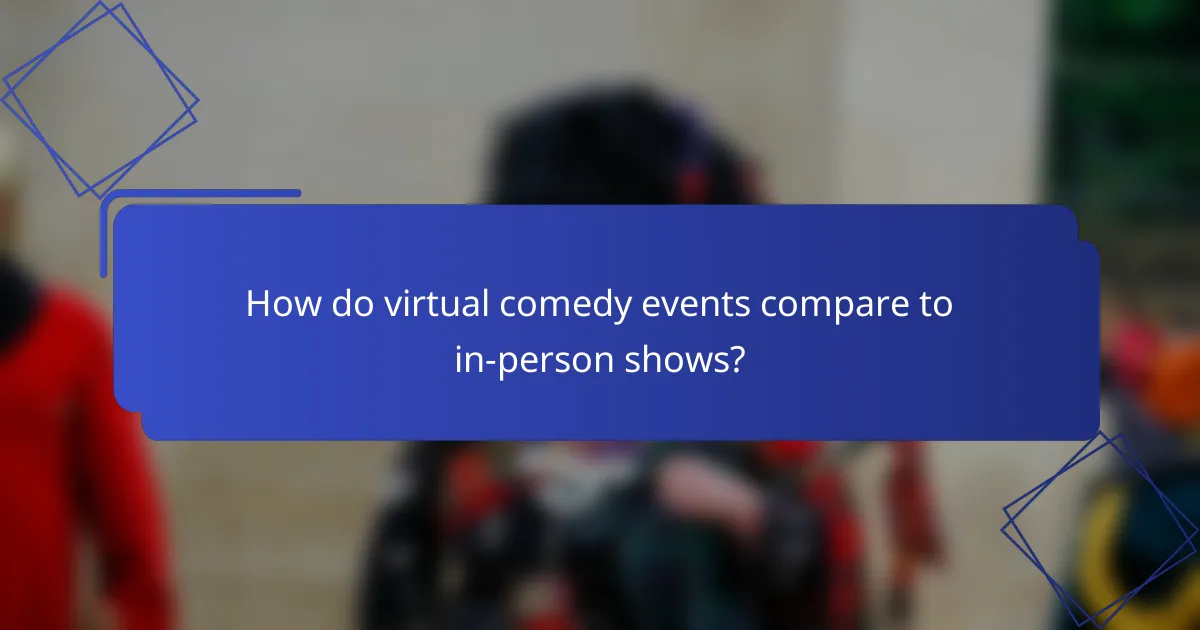
How do virtual comedy events compare to in-person shows?
Virtual comedy events offer a different experience compared to in-person shows, primarily in terms of cost, accessibility, and audience engagement. While they can be more affordable and reach a wider audience, the atmosphere and interaction levels may vary significantly from traditional live performances.
Cost-effectiveness of virtual events
Virtual comedy events typically have lower overhead costs than in-person shows. Expenses such as venue rental, travel, and accommodation for performers are minimized or eliminated, making it easier for organizers to offer tickets at lower prices.
For audiences, this means access to comedy shows that may otherwise be financially out of reach. Ticket prices can range from free to modest fees, often under $20, allowing more people to participate without significant financial burden.
Accessibility for global audiences
One of the key advantages of virtual comedy events is their ability to reach a global audience. People from different countries can join the same event, breaking geographical barriers that limit in-person shows.
This accessibility allows comedians to tap into diverse markets and fan bases, enhancing their reach. Additionally, many platforms offer features like subtitles or translations, further accommodating various language speakers.
Atmosphere and audience interaction
The atmosphere of virtual comedy events can differ greatly from in-person shows. While in-person performances benefit from live energy and immediate audience reactions, virtual events often rely on chat features and reactions to gauge audience engagement.
However, some platforms now incorporate interactive elements like polls and Q&A sessions, which can enhance audience participation. Still, the lack of physical presence may lead to a less immersive experience for some attendees.
Technical requirements for participation
Participating in virtual comedy events requires basic technical setup, including a stable internet connection, a computer or mobile device, and access to the event platform. Most events use popular video conferencing tools or dedicated streaming services.
Attendees should ensure their devices meet the minimum requirements for video and audio quality to fully enjoy the experience. It’s advisable to test the setup beforehand to avoid technical issues during the show.
Performance reach and scalability
Virtual comedy events can scale significantly, allowing comedians to perform for hundreds or thousands of viewers simultaneously. This scalability is a major advantage over traditional shows, which are limited by venue capacity.
Comedians can also record their performances and share them later, extending their reach beyond the live event. This flexibility enables artists to build a larger following and monetize their content through various channels.
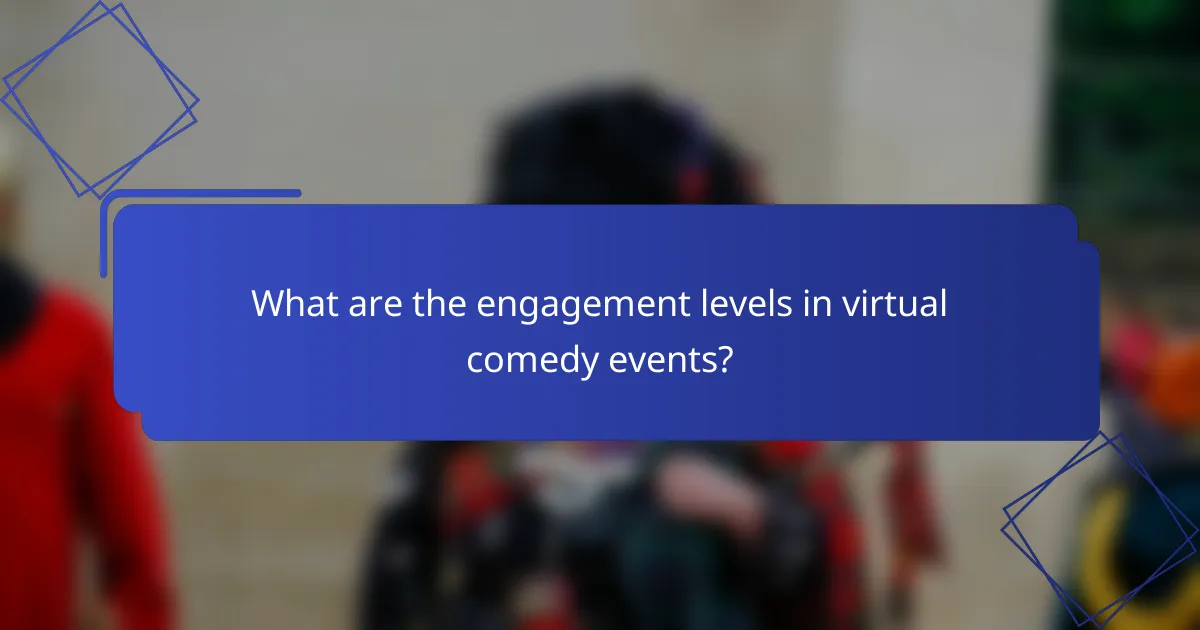
What are the engagement levels in virtual comedy events?
Engagement levels in virtual comedy events can vary significantly compared to in-person shows, often relying on technology to foster interaction. While virtual formats can reach a broader audience, they may lack the immediate energy and connection found in live performances.
Audience participation tools
Audience participation tools are essential for enhancing engagement in virtual comedy events. Features like live polls, Q&A sessions, and chat functions allow viewers to interact directly with performers. For example, using platforms that support real-time voting can help comedians tailor their sets based on audience preferences.
When selecting a platform, consider its user-friendliness and the variety of interactive tools it offers. Popular choices include Zoom, Crowdcast, and Twitch, each providing different levels of audience engagement capabilities.
Real-time feedback mechanisms
Real-time feedback mechanisms are crucial for comedians to gauge audience reactions during virtual shows. Tools such as emoji reactions, chat comments, and live feedback forms enable performers to adjust their delivery on the fly. This immediate response can help maintain the energy of the show, similar to the laughter and applause in a live setting.
Utilizing these mechanisms effectively can enhance the overall experience. Comedians should encourage viewers to use reactions and comments actively, creating a more dynamic atmosphere.
Social media integration
Social media integration plays a significant role in boosting engagement for virtual comedy events. Comedians can promote their shows across platforms like Instagram, Twitter, and Facebook, encouraging followers to join and participate. Additionally, sharing clips or highlights post-show can keep the conversation going and attract new audiences.
To maximize impact, comedians should create shareable content and encourage attendees to post about their experiences using event-specific hashtags. This strategy can enhance visibility and foster a sense of community among viewers.
Post-event engagement strategies
Post-event engagement strategies are vital for maintaining audience interest after a virtual comedy show. Sending follow-up emails with highlights, feedback surveys, or exclusive content can keep the audience connected. Offering discounts for future events or merchandise can also incentivize continued engagement.
Comedians should consider creating a dedicated online community, such as a Facebook group, where fans can interact and share their thoughts. This ongoing interaction can help build a loyal following and encourage repeat attendance at future shows.

What are the benefits of hosting virtual comedy events?
Hosting virtual comedy events offers unique advantages that can enhance audience engagement and broaden reach. These benefits include the ability to connect with a larger audience, reduced costs, flexible scheduling, and increased opportunities for collaboration.
Wider audience reach
Virtual comedy events can attract viewers from diverse geographical locations, breaking down the barriers of physical attendance. This means comedians can engage with audiences from different cities, states, or even countries, significantly increasing their potential fan base.
For example, a comedian based in New York can perform for an audience in Los Angeles or London without the need for travel. This expanded reach can lead to higher ticket sales and greater visibility for performers.
Lower overhead costs
Hosting virtual events typically incurs lower overhead costs compared to in-person shows. Expenses such as venue rental, travel, and accommodation are eliminated, allowing comedians to allocate their budget more effectively.
Many platforms offer affordable or even free options for hosting events, making it easier for emerging comedians to enter the market without significant financial risk. This cost-effectiveness can also lead to more competitive ticket pricing for audiences.
Flexibility in scheduling
Virtual comedy events provide greater flexibility in scheduling, allowing comedians to choose times that suit their audience’s availability. This adaptability can lead to higher attendance rates, as viewers can join from the comfort of their homes.
Comedians can also experiment with different time slots, such as weekday evenings or weekends, to see when their audience is most engaged. This flexibility can be particularly beneficial for reaching international audiences across various time zones.
Opportunities for collaboration
Virtual platforms facilitate collaboration between comedians, allowing them to perform together regardless of their physical locations. This can lead to unique shows that blend different comedic styles and attract a wider audience.
Comedians can easily partner with others for joint events, guest appearances, or even online festivals, enhancing their visibility and creating fresh content. These collaborations can also foster a sense of community among performers and audiences alike.
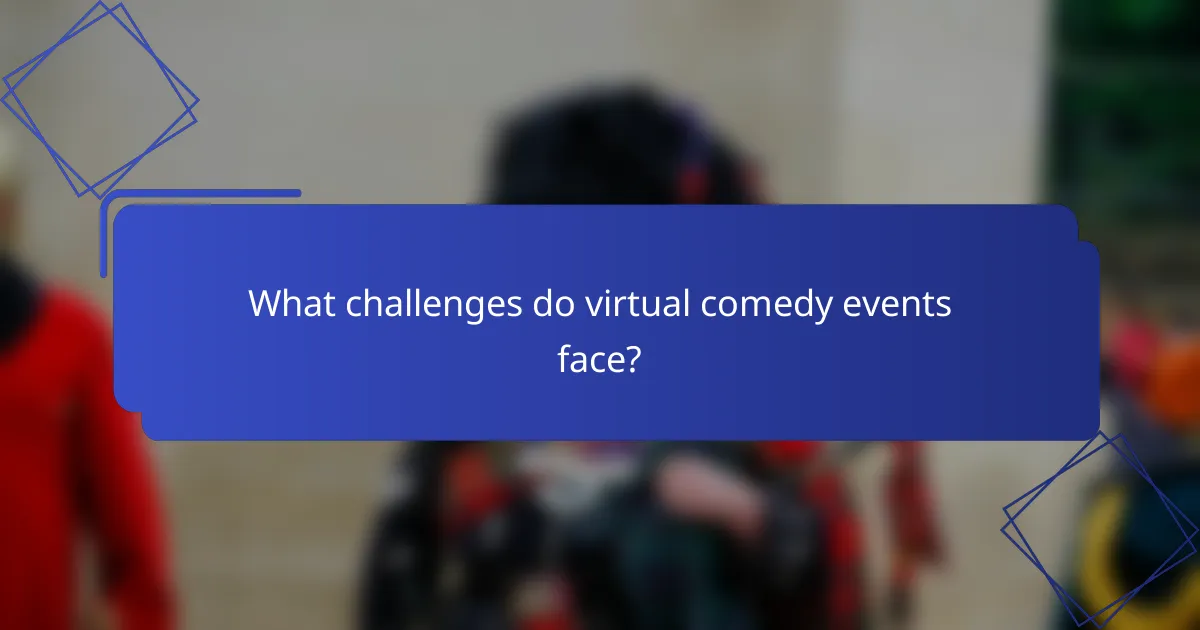
What challenges do virtual comedy events face?
Virtual comedy events encounter several challenges that can impact their effectiveness and audience engagement. Key issues include technical difficulties and the struggle to maintain audience attention throughout the performance.
Technical issues during live shows
Technical problems can disrupt the flow of virtual comedy events, leading to frustration for both performers and viewers. Common issues include poor internet connectivity, audio lag, and video quality fluctuations, which can detract from the comedic timing essential for effective delivery.
To mitigate these challenges, performers should conduct thorough technical checks before the show, ensuring a stable internet connection and testing audio and video equipment. Using reliable platforms with good support can also help minimize disruptions.
Maintaining audience attention
Keeping an audience engaged in a virtual setting is often more challenging than in-person shows. Distractions in viewers’ environments, such as family members or notifications from devices, can lead to diminished focus on the performance.
To enhance engagement, comedians can interact with the audience through polls or Q&A sessions, encouraging participation. Shorter sets and varied content can also help maintain interest, as well as utilizing visual aids or multimedia elements to create a more dynamic experience.
